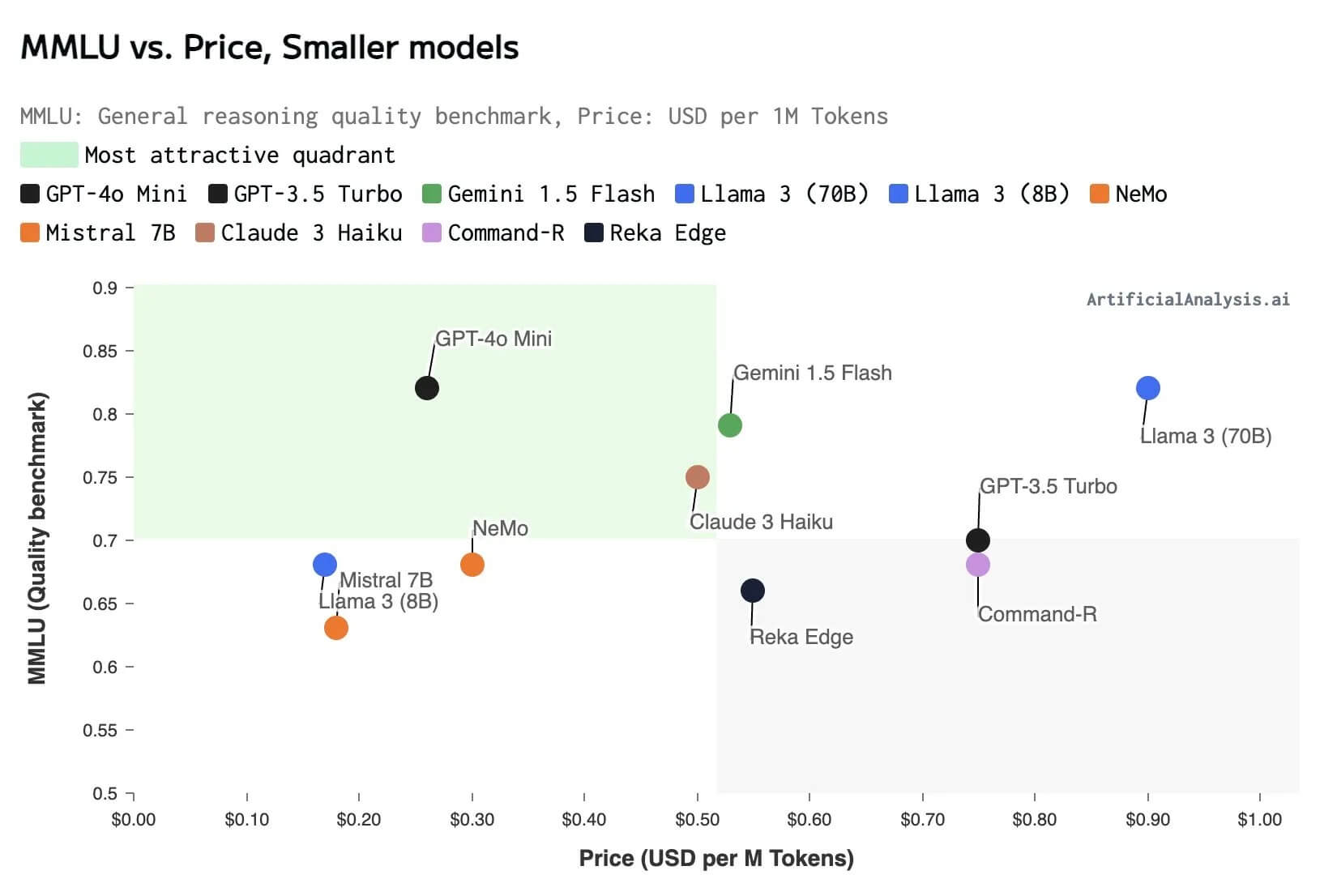(maadaa AI News Weekly: July 16 ~ July 22)
1. OpenAI Unveils GPT-4O Mini: A Compact Powerhouse Transforming ChatGPT and AI Training Efficiency
News:
OpenAI has introduced GPT-4O Mini, a smaller version of its GPT-4 model, designed to power ChatGPT. This new model aims to deliver high performance while being more efficient in terms of computational resources.
Key Points:
- GPT-4O Mini is a compact version of GPT-4.
- It is designed to enhance ChatGPT’s performance.
- The model is optimized for efficiency, reducing computational costs.
- OpenAI aims to make advanced AI more accessible with this release.
Why It Matters:
The introduction of GPT-4O Mini is significant because it enables the development of more efficient training datasets. By reducing computational costs and resource requirements, it allows for broader accessibility and scalability of AI technologies. This can lead to more widespread use and integration of advanced AI in various applications, enhancing the overall quality and diversity of training datasets.
2. Mistral NeMo 12B: NVIDIA and Mistral AI’s Enterprise Powerhouse Reshaping AI Frontiers
News:
NVIDIA and Mistral AI have launched Mistral NeMo 12B, a cutting-edge language model tailored for enterprise use. This model leverages NVIDIA’s advanced hardware and software to deliver high performance and efficiency in various applications.
Key Points:
- Mistral NeMo 12B is designed for enterprise applications, supporting tasks like multi-turn conversations, math, reasoning, and coding.
- Features a 128K context length for handling extensive information.
- Released under the Apache 2.0 license, promoting innovation.
- It uses the FP8 data format for efficient inference.
- Can be deployed easily as an NVIDIA NIM inference microservice.
Why It Matters:
The release of Mistral NeMo 12B is significant as it enhances training datasets by offering a high-performance, efficient model optimized for enterprise use. Its ability to handle complex tasks and large context lengths improves the quality and diversity of training data, fostering broader AI adoption and innovation across various industries.
3. AI Giants Like Apple, Nvidia, and Anthropic Accused of Swiping YouTube Videos for Training Models
News:
An investigation revealed that major AI companies, including Apple, Nvidia, and Anthropic, used subtitles from over 173,000 YouTube videos to train their AI models without permission. This practice, which violates YouTube’s terms of service, has sparked significant ethical and legal concerns among content creators and the broader community.
Key Points:
- Unauthorized Use: Subtitles from 173,536 YouTube videos were used without permission.
- Companies Involved: Apple, Nvidia, Anthropic, and Salesforce leveraged this data.
- Diverse Sources: Data came from educational channels, news outlets, and popular YouTubers.
- Ethical Concerns: Content creators were not notified or compensated.
- Legal Implications: Raises questions about copyright, consent, and fair use.
Why It Matters:
This news highlights the ethical and legal challenges of using publicly available data for AI training. The diverse and extensive YouTube dataset enhances AI models by providing a wide range of real-world scenarios, but the lack of consent and compensation for content creators underscores the need for clearer regulations and ethical guidelines in AI development.
URL: https://youtu.be/od9lve4SvqI
Additional News:
1. Tech giants like Google, OpenAI, and Microsoft have created CoSAI to ensure AI safety and security by developing best practices and open-source tools for industry use.
2. Opera has introduced a new Opera One browser version featuring the “Aria” AI assistant for summarizing web content, translating, and creating images and audio. It also offers a “page context mode” for inquiries about the current web page.
3. Fei-Fei Li, the “godmother of AI,” founded World Labs, valued at $1 billion in four months. Known for ImageNet and advising the White House on AI.
4. A hacker group called NullBulge claims to have breached Disney’s internal communications and leaked 1.2 terabytes of data, including information about the company’s approach to AI and artist contracts. Disney is investigating the matter.
5. Tinder has a new AI-powered feature called Photo Selector to help users pick better photos for their dating profiles, aiming to “take out the guesswork” and provide a diverse selection optimized to help users find a match.
6. Google’s new app, Vids, in Workspace Labs, simplifies video presentations with AI technology, Gemini, making it as easy as creating slide decks.
maadaa.ai Shared Open and Commercial Datasets:
Open Dataset 1: InternVid
InternVid is a large-scale video-text dataset containing over 7 million videos, yielding 234 million video clips paired with detailed captions, designed to advance multimodal AI understanding and generation. Spanning 16 diverse scenes and approximately 6,000 actions, the dataset offers rich computational features, including video-text correlations and visual aesthetics, providing a comprehensive resource for training cutting-edge AI models in video and text understanding.
URL: https://github.com/OpenGVLab/InternVideo/tree/main/Data/InternVid
Open Dataset 2: Social IQ
Social IQ datasets are specialized resources designed to train AI models in understanding complex social interactions, featuring multimodal data including video recordings paired with open-ended questions. These datasets push AI beyond basic language and image processing, challenging models to grasp intricate human dynamics and make grounded inferences about social contexts.
URL: https://www.kaggle.com/datasets/mathurinache/social-iq
Commercial Dataset 1: Car Key Point Identification Dataset
The “Car Key Point Identification Dataset” is designed for applications in visual entertainment and autonomous driving, featuring a collection of internet-collected images with a resolution of 640 x 512 pixels. This dataset employs bounding boxes to identify target cars and annotates 14 key points on each vehicle, including the four top points, the four lights, the four wheels, and the glass areas on the front and left side, providing detailed data for car modeling and recognition tasks.
URL: https://maadaa.ai/datasets/DatasetsDetail/Car-Key-Point-Identification-Dataset
Commercial Dataset 2: Chinese Natural Language Emotion Classification Dataset
A large amount of dialogue data, about 1500k, is used to classify the emotions in the conversation, which are divided into 11 sub-categories, including smile, doubt, sadness, fear, anger, surprise, sorry, shyness, comfort, calm, and helplessness. The application scenarios are Internet, mobile,etc.
URL: https://maadaa.ai/datasets/DatasetsDetail/Chinese-Natural-Language-Emotion-Classification-Dataset



